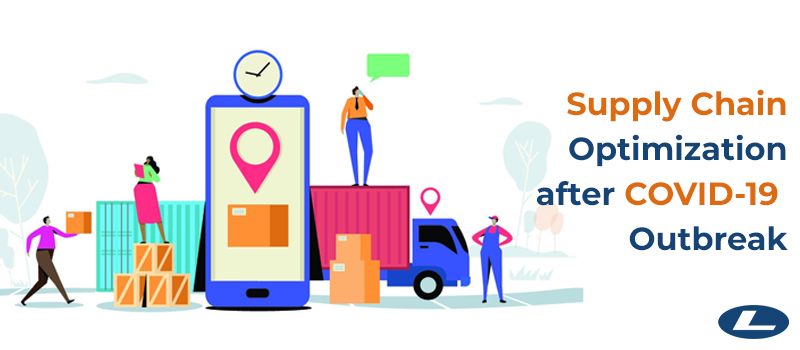

You will agree on the fact that the supply chain is a tricky task, and now after the COVID-19 outbreak, it has become much complex than ever. Businesses all over the world are re-examining the risks involved in their operations and implementing new sourcing strategies. As a retailer, you need to understand why supply chain transformation is necessary, and where you should focus your efforts to gain maximum output. What are the critical areas? How can you identify them? What measures do you need to take to have a positive impact across the value chain and optimize customer experience to build agility and flexibility?
Every business has a unique set of operations and works accordingly. But there are two key areas related to supply chain optimization on which every retail has to focus on and can benefit from:
MEASURING DEMAND & OPTIMIZING INVENTORY
If you can predict demand and handle inventory accurately, you can speed-up growth and optimize costs more precisely. Since the COVID-19 outbreak started, demand planning has become a more important component in a modern supply chain. It lets you accurately plan and predict product demands across physical and digital channels. Demand planning works in three phases:
Shaping: Demand creation via promotions, marketing campaigns, face-to-face customer interactions, events, etc…
Forecasting: Analyzing sales data to predict future demand.
Sensing: Identifying short-term fluctuations in the market and addressing them on time.
Inventory plays a crucial role in accurate demand planning. It helps organizations improve flexibility and agility. Having real-time inventory visibility and capture abilities are necessary for demand forecasting to improve accuracy. As a retailer, you need to use data-enabled tools and technologies to keep track of your business insights and work. Optimizing your inventory can improve the short-term forecasting accuracy by analyzing multiple variables like:
- E-commerce shopping trends,
- Commercial insights,
- Marketing campaigns,
- Pricing of items based on market demand, etc.
LOGIC helps its clients to reduce the forecasting processing time through the use of cloud-based ERP tools. Retailers can optimize their inventory levels against attributes such as profit margins, cost, space, shelf-life, etc. We focus on cost optimization within the supply chain by improving demand planning and inventory management.
FASTER FULFILLMENT
Right now, people are adopting online purchases because of the ongoing COVID-19 pandemic. The main challenge that retailers are facing is to adapt and expand their traditional supply chains to serve the customers better. It requires rethinking their fulfillment strategy, which is the process of receiving, packaging, and shipping orders. As a retailer, you need to work on ways to make fulfillment more profitable without compromising customer experience.
If you want to cop-up with today’s digital age, re-engineering your traditional Physical channels to Omni-channel fulfillment. It will help you to reduce costs and increase digital orders fulfillment speed. As the consumers are shifting to digital channels for shopping, the fulfillment strategy designed by LOGIC can help you to eliminate silos to support omni-channel strategy in your supply chain.
FOUR SUPPLY-CHAIN STRATEGIES TO THRIVE IN THE CURRENT SCENARIO
Implementing supply-chain strategies has become a complex task as organizations need to respond to an outside-in, demand-driven world. The ongoing pandemic and changing economic stats have forced various enterprises to re-examine their business-continuity risks and implement new sourcing strategies. Following are four supply-chain strategies that can help your business to thrive in the post-COVID-19 era:
- Adopting The Demand-Driven Business Operation Model And Planning With Real-Time Demand Shaping And Insights
Using tools to enable supply-chain management teams to take action faster, and automatically adjust supply chains according to real-time insights for fulfilling expected demand. Cloud can play a major role in the supply chain. You can shift your business to the cloud, which will give you a new level of planning accuracy and predictive capability.
- Building An Agile & Adaptive Supply Chain With Integrated Production & Rapid Planning
When it comes to supply-chain management, agility is a necessary component to align planning with manufacturing, driving greater operational flexibility and speed. For this, you need a fully integrated solution that can integrate planning with execution in real-time. LOGIC provides a cloud-based business solution to link materials-planning and financial tasks with business-executive processes such as inventory management, procurement, and manufacturing. It will enable you to act faster and adapt accordingly to the changing dynamics of your market.
- Integrating Supply Chain With Business Goals By Aligning Operations And Sales Planning With Corporate Business Planning
In the last couple of months, business risks have risen significantly for various companies. That’s why it’s necessary to integrate tactical S&OP programs with strategic forecasting and budget efforts. It will help you to improve business agility by developing a closed-loop from planning and execution to performance management. The macro-business risks and priorities will get translated to on-the-ground execution tasks to reflect rapidly changing market scenarios.
- Introducing Sustainability Into The Supply Chain Process
Sustainability should be a key priority for you as it places a focus on supply-chain activities.
- The SCM teams should develop long-term targets for improving sustainability key-measures like energy usage, items sales/purchase, carbon footprint if any, etc…
- You can move to shared data models to gain real-time insights and end-to-end visibility to optimize the supply chain and ensure its sustainability.
Change is a never-ending process in the supply chain industry. From anticipating driver capacity to continuously evolving sustainability practices, planning is a key obstacle for various SCM professionals. If you want to overcome the challenges of supply-chain management, LOGIC ERP and its cloud-based business solutions can help you in it.

